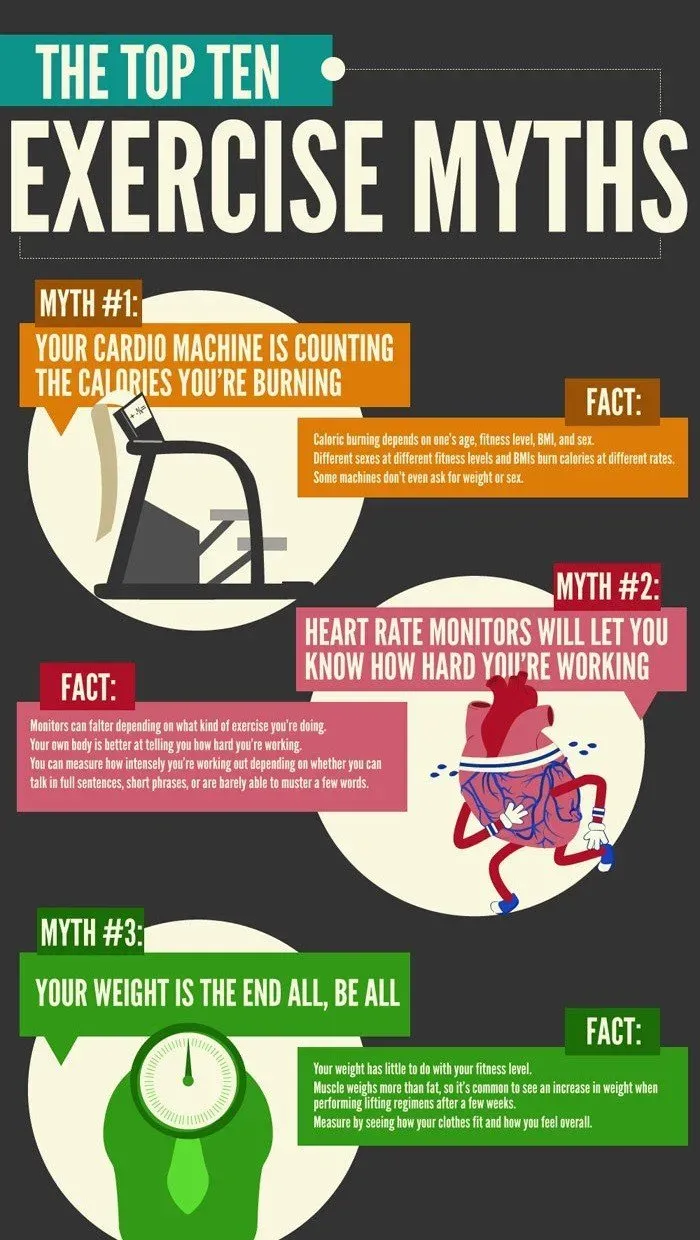Fitness Myths: What You Should Really Know About Exercise
Fitness myths are prevalent in modern society, leading many individuals astray on their journey to health and wellness. These exercise misconceptions can significantly impact not only the effectiveness of your workouts but also your overall outlook on fitness. From the persisting belief in spot reduction myths to the misguided notion that cardio reigns supreme over strength training, it’s crucial to separate fact from fiction. Moreover, the importance of strength training cannot be overstated, especially as it combats muscle loss with aging and enhances overall metabolic health. Join us as we unravel these common fitness myths and equip you with the knowledge to navigate a more informed path to fitness.
When discussing the landscape of health and exercise, it’s vital to address prevalent workout misconceptions that can derail progress. Commonly held beliefs often mislead individuals, such as the idea that targeted exercises can burn fat in specific areas, which is known as the spot reduction myth. Additionally, many tend to overlook the significance of resistance training in favor of cardiovascular workouts, clouding their understanding of effective fitness routines. It’s essential to understand the dual role of both cardio and strength exercises in achieving fitness goals while preventing age-related muscle loss. By debunking these myths, we pave the way for healthier, more holistic fitness practices.
Understanding Exercise Misconceptions
In the world of fitness, exercise misconceptions can lead to misguided routines that do more harm than good. Many individuals enter the gym with preconceived beliefs about what constitutes effective exercise, often relying on outdated or incorrect information. This misinformation can hinder progress, cause discouragement, and even lead to injury. Understanding the truth about exercise can empower you to make informed choices about your fitness regimen.
For instance, one widespread misconception is that simply showing up to the gym equates to a successful workout. However, the reality is that exercise needs to be purposeful and strategic. Quality should trump quantity; hence, focusing on the right techniques, variation, and recovery is essential for achieving fitness goals.
Frequently Asked Questions
What is the spot reduction myth in fitness?
The spot reduction myth suggests that you can lose fat from specific areas of your body through targeted exercises, such as performing crunches to eliminate belly fat. However, research indicates that fat loss occurs uniformly based on overall caloric balance and diet, debunking the effectiveness of spot reduction.
Why is strength training important despite common fitness myths?
Many fitness myths downplay the significance of strength training, but it is crucial for building and maintaining muscle mass, enhancing metabolic rate, and improving bone density. Integrating strength training into your routine alongside cardio promotes better overall health and fitness.
Can I lose weight effectively without doing cardio as part of fitness myths?
Yes, while cardio is often emphasized in weight loss discussions, the myth that it is the only effective method is inaccurate. Strength training can also significantly aid weight loss by increasing your metabolism and promoting muscle growth, making a balanced exercise approach essential.
Is sweating an indicator of workout effectiveness, or a fitness myth?
Many believe that sweating signifies a good workout, but this fitness myth is misleading. Sweat levels vary by individual, and an effective workout can occur without intense sweating, especially during strength or flexibility exercises.
Does aging automatically lead to muscle loss, or is this a fitness myth?
The belief that aging guarantees muscle loss is a fitness myth. Older adults can successfully build muscle through regular strength training, which combats age-related muscle decline and enhances physical health and independence.
What are common exercise misconceptions regarding intensity and duration?
A common misconception is that longer, more intense workouts yield better results. However, focusing solely on workout duration can lead to fatigue and injuries. Quality and intensity of workouts, along with adequate recovery, are far more important than the time spent exercising.
Is there a clear winner between cardio vs strength training in fitness myths?
The myth that one form of exercise is superior to the other is misleading. Both cardio and strength training serve vital roles in a comprehensive fitness routine, providing unique benefits for cardiovascular health, muscle development, and overall wellness.
Are flexibility exercises unnecessary according to fitness myths?
Some fitness myths suggest that flexibility exercises are less important, but this is inaccurate. Stretching and flexibility work improve overall mobility and prevent injuries, making them an essential part of a balanced fitness regimen.
Can women lift weights without getting bulky, or is this a fitness myth?
The myth that women will become bulky through weightlifting is unfounded. Women typically lack the hormonal profile to gain significant muscle mass. Instead, strength training helps tone muscles, enhance metabolism, and improve overall body composition.
Should beginners focus only on cardio in their fitness routine, or is this a misconception?
It’s a misconception that beginners should only focus on cardio. A balanced approach that includes both cardio and strength training is beneficial, as it fosters overall fitness, aids weight management, and improves muscle strength and endurance.
| Fitness Myth | Fact |
|---|---|
| Spot Reduction is a Myth | Fat loss occurs uniformly; specific exercises can’t target fat loss in one area alone. |
| More Exercise Isn’t Always Better | Quality of exercise is more important than quantity; rest is crucial for recovery. |
| Cardio Isn’t the Only Way to Lose Weight | Combining strength training with cardio is key for effective weight management. |
| You Don’t Need to Sweat to Get a Good Workout | Sweating is not a reliable indicator of workout intensity or effectiveness. |
| Aging Does Not Mean You Can’t Build Muscle | Older adults can build muscle through regular strength training. |
| You Shouldn’t Skip Strength Training | Strength training is essential for muscle health, bone density, and metabolic function. |
Summary
Fitness myths can often mislead individuals on their health journey. Understanding these misconceptions, such as the belief that targeted exercises can eliminate fat from specific areas, is crucial for making informed decisions about exercise and nutrition. Prioritize high-quality workouts over sheer duration, and remember that both cardio and strength training play vital roles in weight management. Sweating isn’t the only sign of a good workout, and age does not impair muscle-building capabilities. By debunking these fitness myths, you can develop a more balanced approach that promotes effective and sustainable health practices.
#FitnessMyths #ExerciseFacts #WorkoutTruths #FitnessAwareness #HealthyLiving








